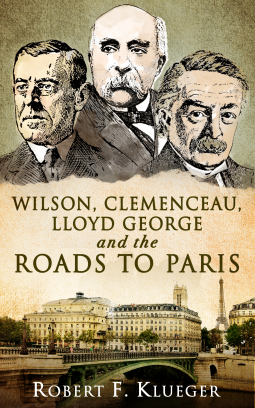
Wilson, Clemenceau, Lloyd George and the Roads to Paris
by Robert F. Klueger
This title was previously available on NetGalley and is now archived.
Send NetGalley books directly to your Kindle or Kindle app
1
To read on a Kindle or Kindle app, please add kindle@netgalley.com as an approved email address to receive files in your Amazon account. Click here for step-by-step instructions.
2
Also find your Kindle email address within your Amazon account, and enter it here.
Pub Date May 19 2021 | Archive Date Jul 17 2021
Talking about this book? Use #WilsonClemenceauLloydGeorgeandtheRoadstoParis #NetGalley. More hashtag tips!
Description
The three men who met in Paris for the most consequential summit conference of the twentieth century were very different men: Georges Clemenceau, 77, “The Tiger” who had spent five decades fighting for the ideals of the French Republic; David Lloyd George, who grew up in poverty in rural Wales, had entered the House of Commons at twenty-seven, had stood alone in his opposition to the South African War, and who rose to become prime minister and become the face of Britain’s defiance to the kaiser; and Woodrow Wilson, the lifelong academic who went from president of Princeton University to the president of the United States in the span of two years.
They were, in many ways, much alike: They were three of the most brilliant men of their age. Each had the ability to charm and sway an audience, whether in the House of Commons, the French Chamber of Deputies or in a Princeton classroom. Yet, the document they produced, the Treaty of Versailles, was the “Carthaginian” peace that sowed the seeds of the Second World War. How did these brilliant men—who knew better—let it happen?
For the first time, Robert F. Klueger traces their tumultuous histories until they reach Paris in 1919, Wilson determined to remake international law based upon the ideals of his Fourteen Points, Clemenceau every bit as determined to make France secure against another German invasion, and Lloyd George, leading a coalition government and a people determined to “make Germany pay,” until, at the very last, he tried and failed to reverse what he saw would be a tragic result.
Advance Praise
"..an immense and highly impressive work of historical/political scholarship. [An] admirably detailed yet still eminently readable account of the lives of three of the twentieth century's most influential politicians..."" —Manhattan Book Review
"...impressively researched, with...fresh insights that will appeal to even seasoned diplomatic historians. Readers will be introduced to myriad rich details about the lives of the early-20th-century's most important world leaders."—Kirkus
Available Editions
| ISBN | 9781736387313 |
| PRICE | $19.99 (USD) |
Links
Average rating from 3 members
Featured Reviews
Although there is a lot of literature on the subject and the era, I recommend this book. Wonderfully researched, comprehensive, and showing not only the life of some of the world's greatest leaders but also the era in which the world in which we live today was largely built.
 Kevin M, Reviewer
Kevin M, Reviewer
Thanks to the publishers and NetGalley for the advanced review copy of this mighty book. Weighing in at over 800 pages, I can only do justice to the book by taking the approach of an episodic review. This first instalment is written after 23% of the book has been written.
The first impression is that the writing of this book represents something of a labour of love for the author. His admiration for the three great statesmen, albeit occasionally qualified, is apparent from the start. Another initial judgment that has been discarded was that Mr Krueger ought to have been more ruthless in editing as there is a wealth of detail about the early lives of the three subjects that appears, at first sight, to be incidental and even irrelevant to the overall structure of the book. And yet…..the reader soon appreciates that the author is making sure that readers have more than a superficial understanding of the nineteenth century world of young Clemenceau, Wilson and Lloyd George that is not easy for readers familiar with the world of the early years of the twenty first century to appreciate. Similarly, the extended sections on significant historical events - the Franco-Prussian War, the Paris Commune, the Dreyfus affair and The Boer War - merit inclusion on their own terms, given their influence on the political evolution of the three statesmen. So far, then, an excellent start to this work and one that will appeal to all those who wish to understand the world as it existed before the First World War and how this shaped the politics of the time.
After a brief pause to read and review other books I returned refreshed to Klueger’s masterly account and was pleased to see the same very positive features in the next section, which has seen me reach halfway through the book. The reader has been treated to more than a simple tour d’horizon in terms of these history-defining years from the Franco-Prussian war to what is now the eventful year of 1917. The format of following the three statesmen has continued, but - inevitably - their stories increasingly impinge on each other. On the way through these years, though, the contributions each has made to their individual nations or in the wider field of international diplomacy have been covered in Klueger’s carefully summarised accounts. In this way, the reader is left better informed, for example, about the major constitutional changes to the ability of the House of Lords to reject legislation and the relatively unstable French governments that characterised the period up to the start of the war. It is a real delight to report that, rather than being exhausted by the sheer length of this book, I look forward to a continuing pleasure as I contemplate the second half………
For many readers the focus of the final chapters on the Peace Conference are, perhaps, what they expected from the book. My earlier judgments concerning the details provided of the early lives of the three great statesmen still stands, although it is now clearer that Klueger has more doubts over Wilson’s role. Observing how the views of these very different individuals have been informed by the events they have witnessed, or have helped to shape, contributes significantly to the reader’s understanding of their actions and their attempts to influence the outcome of the Peace Conference.
Klueger provides exhaustive detail over the meetings of the Big Four, and the contributions of their advisers. In passing, it is noteworthy that Orlando, Prime Minister and Italian representative at the Peace Conference, features as a relatively minor player in Klueger’s account. This seems a little odd, given that he was a member of the ‘Big Four’ alongside Clemenceau, Wilson and Lloyd George. Klueger seems to see him in a tactical role, focused especially on Italy’s territorial claims, rather than a more strategic role in respect of the broader issues to be settled by the Peace Conference.
Looking back over the intervening century and more it is all too easy to imagine how straightforward it might have been for these statesmen to agree on the terms to be presented to Germany, particularly given our knowledge of how other subsequent major wars have been concluded. Although the USA had only declared war on Germany in 1917, all four countries had engaged in a war unprecedented in its scale, scope and destructiveness. Surely, one might think, the desire for a lasting peace would lead to a swift agreement over how to convert the armistice to a permanent settlement?
The author sets out clearly to establish why such an ambition was destined to be difficult to realise. He argues that Wilson had always approached the end of the war from a detached perspective, with little apparent understanding of the impact of violent and ruthless occupation of Belgium and north east France and the four years of wearying existential conflict experienced by the remaining members of the Big Four. His ‘Fourteen Points’ and ambitions for a League of Nations that would put an end to war could never be the main focus of the other three members, who saw them in many respects as naive and impractical. Their shared and lengthy experiences of the horrors of mechanised warfare meant that the relatively magnanimous settlement envisaged by Wilson would elude the parties involved.
Klueger takes the reader through the various negotiations, arguments and trade offs that proved necessary to achieve a conclusion to the Peace Conference. He expresses sympathy and understanding for the position of Clemenceau, representing a country that had suffered defeat, humiliation, occupation, payment of reparations and loss of territory in 1870, in addition to the destruction by occupying German forces in the recent war . His conclusion over Wilson’s contribution is far less sympathetic, regarding him as having the greatest potential to achieve something closer to an enduring peace but hobbled by his refusal to seek consensus and preparedness to accept compromises in pursuit of a greater goal. This perhaps paints Wilson as something less than the somewhat messianic figure offered by other authors; Klueger also notes that he was prepared to sanction various deals over transfers of territory and other decisions that paid scant regard to his Fourteen Points in order to safeguard his vision for the League of Nations. In this context it is ironic, and perhaps telling, that the provisions relating to the League were never endorsed by Congress.
Klueger regards Lloyd George as the leader with the greatest level of statesmanship in the way he approached the conference by ‘seeking to forge compromise from irreconcilable contenders’. Although Lloyd George was seen as somewhat sceptical, Klueger regards him as sympathetic to the idea of the League of Nations but not to the extent of limiting the effectiveness and protection afforded to Britain by the Royal Navy.
It is always tempting to attempt to capture all themes in a review. With a book this size that is clearly impossible. Rest assured that the many relevant issues not covered here, for example regarding war debts and reparations are given considerable coverage in this book. The best overall judgment may be that it should be required reading for anyone looking to gain a better understanding of how the main elements of the Treaty of Versailles were shaped by the discussions and arguments between the leaders of France, Britain and the United States.





